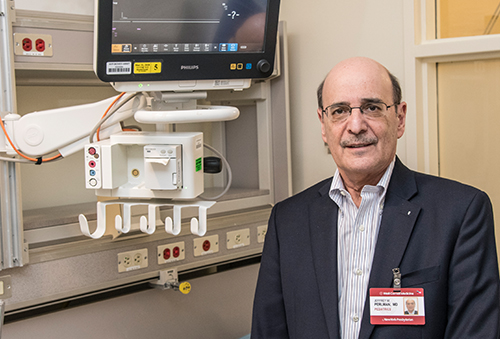Fetal inflammatory response syndrome (FIRS) is a condition characterized by inflammation of the umbilical cord and elevated fetal pro-inflammatory cytokines. Neonates who survive, especially very preterm infants, have increased rates of neonatal morbidity, including neurodevelopmental impairment. In the August 2020 issue of Seminars in Fetal and Neonatal Medicine, neonatologists Vivien Y. Yap, MD, and Jeffrey M. Perlman, MD, Director of the Neonatal Intensive Care Unit at NewYork-Presbyterian Komansky Children’s Hospital, describe the mechanisms and origins of this complex syndrome.

Dr. Jeffrey Perlman
According to the researchers, fetal brain exposure to inflammation can increase the risk of neurodevelopmental impairment through childhood and adulthood. The severity of the inflammation relates to the severity of this impairment, with necrotizing funisitis, an umbilical cord lesion, and severe chorionic vasculopathy among the highest rate of impairments.
The researchers note that a diagnosis of FIRS is initially considered following birth in preterm infants who sustained prolonged premature rupture of membranes or maternal clinical chorioamnionitis and in term gestation infants with neonatal encephalopathy inconsistent with a hypoxic-ischemic injury when there is presence of chorioamnionitis and/or funisitis.
In their review, the physicians describe the potential mechanisms of brain injury involved in FIRS:
- pro-inflammatory cytokines – can cause direct injury to the developing brain by inducing apoptosis and disrupting the differentiation of neurons and oligodendrocytes at a critical period of fetal brain development during active myelination
- blood-brain barrier – is vulnerable in the presence of inflammation, increasing permeability to peripherally created inflammatory cells and other cytotoxic proteins
- microglial activation – can alter brain development when inflammatory and cytotoxic mediators are released further heightening fetal brain injury
- oligodendrocytes – are susceptible to various insults resulting from exposure to perinatal infections and inflammatory cytokines, which leads to apoptosis of pre-myelinating oligodendrocytes
- glutamate – likely plays a key role in the mechanism of injury to the developing gray matter resulting from persistent inflammation and explains some of the neurodevelopmental impairments
Exposure to intrauterine inflammation alters innate and adaptive immune pathways in the immature preterm host with possibly lasting sequelae in the newborn.

Dr. Vivien Yap
Dr. Yap and Dr. Perlman also discuss the “multiple hits hypothesis,” citing studies that suggest thatexposure to fetal inflammation may not be sufficient to induce brain injury alone, but could be a contributor, especially in the very preterm newborn when exposed to additional systemic insults. These include hypoxic-ischemic injury or postnatal pro-inflammatory exposures brought on by mechanical ventilation, bronchopulmonary dysplasia, or necrotizing enterocolitis. They also note, “exposure to intrauterine inflammation alters innate and adaptive immune pathways in the immature preterm host with possibly lasting sequelae in the newborn. The downstream effects of this immune dysregulation may also lead to further organ injury, including the brain.”
Given the serious nature of fetal inflammatory response syndrome and a lack of current therapies to protect or repair against brain injury, Dr. Yap and Dr. Perlman recommend that future research focus on therapeutic interventions that diminish the fetal inflammatory response, inhibit microglial activation, and regenerate immature oligodendrocytes.



